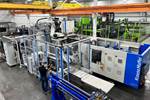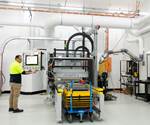Radius Engineering supplies NIAR with thermoplastic consolidation workcell
NIAR ATLAS facility will use the workcell to produce precisely consolidated laminates for thermoplastic aerospace structure process strategy development.
Photo Credit: Radius Engineering
Radius Engineering (Salt Lake City, Utah, U.S.) has been selected by the National Institute for Aviation Research (NIAR) at Wichita State University (Wichita, Kan., U.S.) to supply a thermoplastic consolidation workcell to its Advanced Technologies Lab for Aerospace Systems (ATLAS) facility.
The Radius thermoplastic consolidation workcell installation will provide ATLAS researchers and engineering students with precisely consolidated laminates. These laminates will be used to develop processing strategies for next-generation thermoplastic aerospace structures for NIAR and its industry partners. ATLAS, a multi-disciplinary manufacturing environment and engineering education program, aims to provide a neutral ground for advanced manufacturing research and development (R&D) with state-of-the-art machines, software and processing options.
The Radius Engineering workcell provides up to 350 tons of clamping force with the company’s distributed pressure system (DPS). According to Radius, the workcell DPS will provide evenly distributed consolidation pressure for optimal laminate quality over an area of 4 × 4 feet (1.2 × 1.2 meter). The DPS delivers precise laminate consolidation pressures from 50-300 psi (3.5-21 bar) within a tolerance of ±5 psi (±0.3 bar) throughout the full operating range, on variable laminate sizes. The workcell includes an integrated temperature control system with programmable heating and cooling rates to a maximum operating temperature of 800°F (426°C). Radius’ proprietary Insights Software provides intuitive programming controls along with data collection and analysis tools that are Industry 4.0 compatible.
Radius, an AS9100D-certified equipment and service supplier, delivers net-shape composites manufacturing capability by providing tooling, equipment and know-how. It leverages its knowledge as a composites processing expert, backed by 35 years of experience, to develop customizable machines and turnkey workcells that provide high levels of performance for the processing of aerospace-quality composites.
Related Content
-
Braided thermoplastic composite H2 tanks with co-consolidated molded boss areas to fit EV battery space
BRYSON project demonstrates possible designs, automated manufacturing and low permeability concepts, including EVOH liner and novel PPA matrix.
-
Plant tour: Daher Shap’in TechCenter and composites production plant, Saint-Aignan-de-Grandlieu, France
Co-located R&D and production advance OOA thermosets, thermoplastics, welding, recycling and digital technologies for faster processing and certification of lighter, more sustainable composites.
-
Update: THOR project for industrialized, recyclable thermoplastic composite tanks for hydrogen storage
A look into the tape/liner materials, LATW/recycling processes, design software and new equipment toward commercialization of Type 4.5 tanks.



